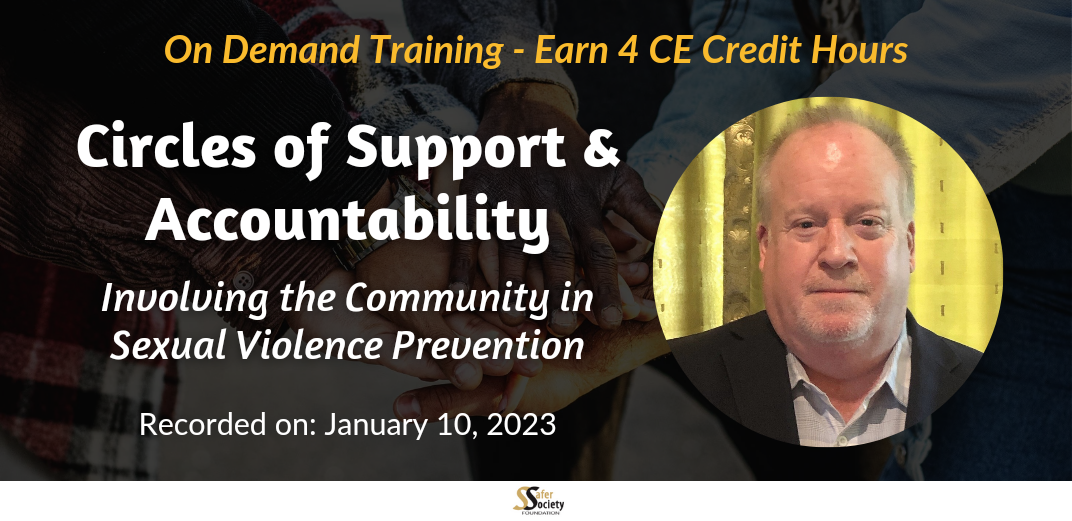
Circles of Support & Accountability: Involving the Community in Sexual Violence Prevention
Already purchased an On Demand training?
Click here to access your Safer Society On-Demand Training Center account.
This training provides an overview of the Circles of Support & Accountability (CoSA) model of community supervision and management of persons who have sexually abused. It provides a review of what does and doesn’t work in the implementation of this model. It offers critiques of other supervision and management approaches as well as an examination of how people desist from criminal behavior. Dr. Wilson then discusses what is needed to begin implementing CoSAs. Finally, he explores why CoSAs work and summarizes the extant research on their effectiveness.
Circles of Support & Accountability (CoSA) is a restorative justice-informed initiative intended to assist in the post-release community integration of persons with sexual offense histories after long periods of incarceration or other detention. Typically focused on high-risk, high-need individuals, it employs community volunteers trained and supported by local professionals and experts. The model emerged in the 1990s in Canada during a time when some individuals at particularly high risk of reoffending sexually were being released with no formal aftercare plans. Since its inception, CoSA has been consistently shown to significantly reduce harm while increasing the likelihood of successful integration of participants into the community. Based on a small but rather encouraging research base, the CoSA model has flourished in international jurisdictions, including Canada, USA, Great Britain, Europe, and Oceania, with more projects emerging every year.
Topics covered include:
- Restorative justice and sexual violence prevention
- Establishment and refinement of CoSA
- Inner workings of CoSA, including developing intentional community, volunteer training, and professional support
- Initial research findings of CoSA effectiveness
- Implementing the model in the UK, USA, and beyond
1) Describe the role of restorative justice in sexual violence prevention.
2) Explain the origins of the CoSA model, including project structure, volunteer recruitment and training, and project implementation.
3) Analyze the relative contributions of professionals and nonprofessionals in sexual violence prevention.
4) Describe the CoSA research base outlining both qualitative and quantitative outcomes.
5) Construct feasibility analyses of establishing a CoSA project in their own jurisdictions.
Audience
This training is for professionals working with people who have perpetrated abuse. Professionals who will benefit from this training include social workers, psychologists, clinical counselors, and interested paraprofessionals.
Content Level
Disclosure
Continuing Education Approval
American Psychological Association (APA)
Safer Society Foundation, Inc. is approved by the American Psychological Association (APA) to sponsor continuing education for psychologists. Safer Society Foundation, Inc. maintains responsibility for this program and its content.
Who's Presenting

Robin Wilson, Ph.D., ABPP
Robin J. Wilson, Ph.D., ABPP is a Canadian researcher, educator, and board-certified clinical psychologist who has worked in clinical and forensic psychology in hospital, correctional, and private practice settings for more than 35 years. Robin has published and presented internationally on the assessment, treatment, and risk management of social and sexual psychopathology. Robin maintains an international practice in clinical and consulting psychology based in Sarasota, Florida, and has been an Assistant Clinical Professor (Adjunct) of Psychiatry and Behavioural Neurosciences for more than 10 years at McMaster University in Hamilton, Ontario. Robin’s current interests are focused on collaborative models of risk management and restoration as persons of risk are transitioned from institutional to community settings, in addition to ensuring responsive clinical and supervisory service delivery for individuals with special needs.
